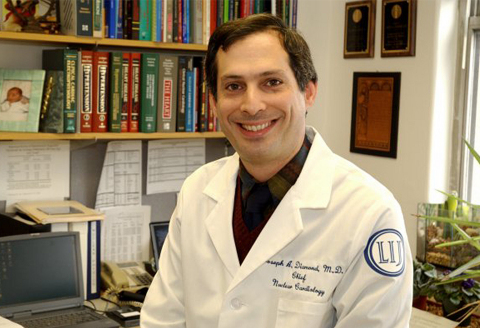Patients most likely to benefit from intensive systolic blood pressure treatment (SBP) versus standard treatment to reduce cardiovascular disease (CVD) may also be at risk for adverse events (AE). In an editorial discussing those risks and clinical decisions to pursue intensive care, Joseph Diamond, MD, of The Feinstein Institutes for Medical Research published an editorial in the Journal of American College of Cardiology (JACC).
This press release features multimedia. View the full release here: https://www.businesswire.com/news/home/20210430005400/en/

Joseph Diamond, MD, recently published in the in the Journal of American College of Cardiology (JACC). (The Feinstein Institutes for Medical Research)
SBP treatment has been shown to prevent CVD events – such as acute coronary syndrome, stroke, heart failure and even death – in at-risk patients. In Dr. Diamond’s article titled “Another Nudge to Overcome the Treatment-Risk Paradox in Blood Pressure Management,” he notes how clinicians often hesitate to recommend an intensive SBP course of care because of a patient’s potential increase of adverse events (AE) and the need for more resources like doctor visits, lab work and medications.
Taking into account another recent study published in JACC, researchers used patient data from the Systolic Blood Pressure Intervention Trial (SPRINT) to develop a CVD prediction model to identify those patients who may benefit the most.
Dr. Diamond echoes the support for prediction modeling. Given the often-conflicting blood pressure guidelines that have been issued over the past several years, the results of the current study with other analyses of SPRINT offer an evidence-based rationale that may urge physicians to overcome the treatment-risk paradox in blood pressure management.
“It is often a challenge for clinicians to determine the best course of blood pressure management just based on pre-treatment characteristics,” said Dr. Diamond, director of the nuclear cardiology at Long Island Jewish Medical Center and associate professor of medicine at the Donald and Barbara Zucker School of Medicine at Hofstra/Northwell. “Using vast patient data, researchers are able to identify the characteristics and patients who may benefit the most from this type of treatment and develop a modeling-tool to better inform their decisions.”
More than 12 million people in the United States are eligible for intensive treatment under current guidelines. This research shows that using SPRINT clinical benefit models can efficiently prioritize that treatment for the patients who would best respond.
“Treatment plans for hypertension can be complicated by serious side effects,” said Kevin J. Tracey, MD, president and CEO of the Feinstein Institutes. “Dr. Diamond provides a compelling argument for evidence-driven approaches which assess risks and benefits to avoid harm and maximize patient benefit.”
About the Feinstein Institutes
The Feinstein Institutes for Medical Research is the research arm of Northwell Health, the largest health care provider and private employer in New York State. Home to 50 research labs, 3,000 clinical research studies and 5,000 researchers and staff, the Feinstein Institutes raises the standard of medical innovation through its five institutes of behavioral science, bioelectronic medicine, cancer, health innovations and outcomes, and molecular medicine. We make breakthroughs in genetics, oncology, brain research, mental health, autoimmunity, and are the global scientific leader in bioelectronic medicine – a new field of science that has the potential to revolutionize medicine. For more information about how we produce knowledge to cure disease, visit http://feinstein.northwell.edu and follow us on LinkedIn.
View source version on businesswire.com: https://www.businesswire.com/news/home/20210430005400/en/
Source: Northwell Health







